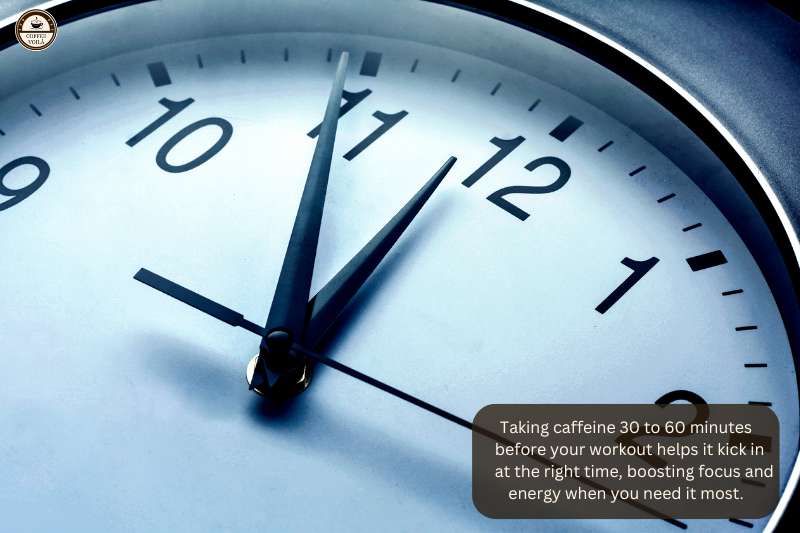Caffeine and Exercise: What the Science Actually Says?
Ever wonder if your morning coffee could improve your workout?
I’ve been hitting the gym for nearly a decade now. Over the years, I’ve tried all sorts of workout programs, some YouTube routines, a couple of paid video courses (those shredded trainers really know how to push you).
They helped a lot with my form and strength. But oddly enough, nobody ever really talked about coffee, especially not how caffeine might affect performance.
Since I run a coffee blog, I figured… why not dig into it myself?
So, a few months ago, I started researching the science behind caffeine and exercise. And what I found surprised me and honestly changed the way I train.
In this post, I’ll break it all down: how caffeine boosts endurance, focus, and fat burning; the best timing and sources; how much you should take; and when to be cautious. So let’s start brewing!
Key Takeaways
- Caffeine boosts both endurance and strength: Whether you’re running long distances or lifting weights, a moderate dose of caffeine (3–6 mg/kg of body weight) can improve stamina, power output, and focus.
- Timing matters: For best results, take caffeine about 45–60 minutes before your workout. This gives it time to peak in your bloodstream so you’re fully “switched on” when it’s time to train.
- Your source of caffeine counts: Coffee is great for everyday use. However, pre-workout supplements offer more precision and consistency. Anyway, be cautious of high sugar and stimulant levels in some brands.
- Too much caffeine can backfire: Side effects like anxiety, sleep disruption, and GI issues are real. You should know your tolerance, avoid late-day doses, and consult a doctor if you have heart conditions or high blood pressure.
What is Caffeine?
Let’s start with the basics. Caffeine is a natural stimulant most commonly found in coffee, tea, chocolate, and some energy drinks or supplements.
Technically, it’s classified as a central nervous system stimulant, which is a fancy way of saying it makes you feel more awake and alert.
What it does is block a neurotransmitter called adenosine, which normally tells your brain it’s time to chill out and feel tired. So when caffeine steps in and blocks those signals, you stay more alert—and sometimes wired, depending on how much you’ve had. That’s why it’s super popular as a pre-workout or morning pick-me-up.
You’ll start to feel the effects within about 30 to 60 minutes after drinking it, and it can stay in your system for 3 to 5 hours—though that can vary depending on your metabolism. Fun fact: the half-life of caffeine (how long it takes for your body to eliminate half of it) is around 5 hours, which is why that 4 p.m. latte can mess with your sleep.
So yeah, it’s not just about the energy boost. Caffeine actually affects your brain, muscles, and even fat metabolism—which is exactly what we’ll dig into next.
How Caffeine Works in the Body?
So, let’s take a look at what happens when caffeine kicks in.

Caffeine Blocks Fatigue by Targeting Adenosine
Caffeine mainly works by blocking something called adenosine, which is a chemical in your brain that tells your body it’s time to rest.
Imagine: Adenosines are like little sleepy messengers that stack up throughout the day. The more they build up, the sleepier you feel.
But when caffeine comes in, it hijacks the adenosine receptors and blocks them. Your brain doesn’t get the “time to chill” signal. For this reason, you suddenly feel more awake and alert.
Stimulates the Central Nervous System
This also fires up your central nervous system, which is why you feel that jolt of energy.
Furthermore, your heart starts beating a bit faster, you feel more alert, and your body’s more ready to move. It gives you a quick mental and physical boost before a workout.
How Long It Takes to Kick In?
It starts working surprisingly fast too. Most people feel the effects within 30 to 60 minutes after drinking caffeine, depending on your metabolism.
I’ve felt the caffeine hit quicker on an empty stomach. So if you’re new to pre-workout caffeine, don’t start with a triple shot.
Why It Matters for Performance?
It’s not just about feeling hyped. Caffeine actually changes how your body responds to effort, which is why it’s such a popular performance booster. But timing and dosage? That’s a whole other game (we’ll get there).
Proven Benefits of Caffeine for Exercise
Caffeine is a legit performance booster, and science backs it up. Once I started looking into the actual studies (and testing things out myself). I realized how much it could help in a workout setting. So, here’s what I found:

1 – Increased Endurance
Studies show caffeine can improve stamina during cardio-heavy workouts like running, cycling, and swimming. One big review found that doses around 3–6 mg per kg of body weight (so ~200–400 mg for most of us) can help people go longer and finish faster.
Furthermore, caffeine may help spare glycogen by increasing fat oxidation, which means your muscles don’t tire out as quickly.
2 – Enhanced Focus and Reaction Time
One thing I didn’t expect when I first tried caffeine before lifting? How zoned-in I felt. When you’re doing compound lifts or running drills that require coordination, that sharp mental edge helps.
Also, caffeine reduces what’s called the “rate of perceived exertion.” In other words, your brain doesn’t register the workout as being quite so hard. That little trick can keep you going longer, especially during high-intensity intervals or circuit training.
3 – Fat Oxidation and Weight Management
Caffeine helps your body burn more fat, especially if you take it before a workout. Research confirms that caffeine increases fat breakdown (lipolysis) and helps you tap into stored fat as a source of fuel.
One study found that doses around 3–7 mg per kg boosted fat burning during exercise, especially in untrained individuals.
Now, it won’t make you shed 10 pounds overnight. However, as a tool for weight management, caffeine plays a supportive role. Just don’t overdo it or expect miracles without effort.
Caffeine and Strength Training: What’s the Link?
If you’ve ever slammed an espresso before a heavy lift and felt like a beast, well, there’s some science backing you up.
Caffeine doesn’t just help with endurance. It can also impact power output and strength, though the results can vary depending on how you train.
One particular study on resistance-trained athletes found that doses of 3–6 mg/kg of caffeine significantly improved mean power output and bar velocity during explosive bench press throws.

That’s the kind of boost that matters when you’re doing speed or power-based lifts.
Now, here’s the kicker:
Caffeine didn’t increase peak power or peak velocity. So you won’t suddenly become Superman. However, you might perform more consistently across multiple sets.
In that same study, the lifters who took caffeine pushed a little harder and moved the bar a little faster every time. Over time, that could add up.
So what does this mean?
If you’re training for strength or power, caffeine might give you an edge, especially in exercises like Olympic lifts, jumps, or throws.
But keep in mind, more isn’t always better. You should start with 3 mg/kg of body weight about 45–60 minutes before your session, and see how your body reacts.
For example, if you weigh around 70 kg (about 154 lbs), that’s roughly 210 mg of caffeine around two strong cups of coffee or one scoop of a typical pre-workout. Always check your labels, though. Some pre-workouts can pack a punch with 300+ mg in a single scoop.
Notes: The fact is that caffeine affects everyone differently. So, try it on a normal training day before testing it on PR day.
When to Take Caffeine for Best Results?
Timing caffeine right can be the difference between crushing your workout… or crashing halfway through it.
I used to sip coffee while tying my shoes and hope for the best. But I later discovered that’s a big mistake. The fact is caffeine doesn’t kick in instantly.

It actually takes about 30 to 60 minutes to really take effect, depending on the form you take. Once I started timing it correctly, especially before strength days, the difference was wild. I noticed more focus, better drive, and less of that sluggish “why am I even here?” energy.
If you’re experimenting with pre-workout caffeine, here’s a breakdown:
| Caffeine Source | Time to Take Before Workout | Onset of Effects | Best For | Pro Tips |
|---|---|---|---|---|
| Black Coffee | 45–60 minutes | ~30–45 minutes | Everyday workouts, light to moderate training | Drink it plain to avoid extra sugar or cream |
| Espresso (Double Shot) | 30–45 minutes | ~25–40 minutes | Strength training, short bursts of energy | Hits faster on an empty stomach |
| Energy Drinks | 30–60 minutes | ~30–45 minutes | Endurance or cardio sessions | Watch for sugar and additives |
| Pre-Workout Supplements | 30–60 minutes | ~20–40 minutes | High-intensity or competitive workouts | Check caffeine content—some have 300+ mg |
| Caffeinated Tablets | 45–60 minutes | ~30–60 minutes | Controlled dosing, sensitive stomachs | Ideal if you want a precise mg/kg dose |
| Iced Coffee/Cold Brew | 45–60 minutes | ~30–45 minutes | Hot weather sessions, casual training | Add brown sugar syrup for flavor + fuel |
What Caffeine Sources Do You Have?
I’ll admit, I’m not a pre-workout kind of guy. Never got into scooping neon-colored powder into a shaker bottle and slamming it before hitting the gym.
I’m more of the classic “sip a strong coffee and hope for the best” type. However, as I researched, I realized that the source of your caffeine can make a significant difference.

Whether it’s a cup of coffee, an energy drink, or a pre-workout supplement, they all hit differently. And they all come with their own little quirks. Some are helpful and others are not much. So, let’s talk about them:
| Caffeine Source | Caffeine Content (Approx.) | Absorption Speed | Pros | Cons |
|---|---|---|---|---|
| Brewed Coffee | 80–120 mg per 8 oz | Moderate | Natural, widely available, low cost | Varies in strength, less precise dosing |
| Espresso | 60–100 mg per shot (1 oz) | Fast | Quick hit of caffeine, concentrated | Can feel jittery if taken too fast |
| Cold Brew / Iced Coffee | 150–200 mg per 16 oz | Moderate | Smooth flavor, good for hot weather | High caffeine in large servings |
| Energy Drinks | 80–300+ mg per can | Moderate to Fast | Convenient, often includes vitamins | High sugar, artificial ingredients, possible crash |
| Pre-Workout Supplements | 150–400+ mg per scoop | Fast | Precise dosing, includes other performance enhancers | Can be overstimulating, expensive, artificial ingredients |
| Caffeine Tablets | 100–200 mg per tablet | Fast | Controlled dosage, travel-friendly | No added nutrients or flavor |
| Green or Black Tea | 30–70 mg per cup | Slow | Mild and long-lasting boost | Too weak for intense workouts |
Natural caffeine vs Synthetic form
Natural caffeine (like in coffee or green tea) tends to feel smoother and longer-lasting.
In contrast, synthetic caffeine, which shows up in a lot of energy drinks and supplements, hits harder and faster. But often it can lead to a crash if you’re not careful.
Notes: If you’re starting or don’t want to mess with formulas and proprietary blends, coffee’s a solid choice. But if you’re pushing hard in the gym or training competitively, you might benefit from the consistency of a good pre-workout. I suggest reading the labels; some ingredients are wild.
What Are The Side Effects?
Caffeine’s a great tool when it works in your favor. But like anything else, it can turn on you if you’re not paying attention. So here are a few things you should consider:

- Sleep disruption: I used to think a 3 p.m. latte was fine until I started tossing and turning at midnight. Now, I cut off caffeine by 2 p.m. at the latest. The reason is that caffeine can linger in your system for up to 6 hours or more, depending on your metabolism.
- Tolerance build-up: The more you drink, the less you feel it. If you’re at 3–4 cups a day and not getting the same kick, it might be time for a reset. A short “caffeine detox” can help you become more sensitive to it again.
- GI issues and anxiety: Some people get stomach cramps or feel jittery when the dose is too high. I’ve learned that anything over 300 mg gives me a tight chest and racing thoughts. So, know your limits.
Who Should Be Cautious with Caffeine?
Some people should tread lightly with caffeine or even avoid it altogether. For instance:

Heart issues, high blood pressure, or anxiety
If you have heart issues, high blood pressure, or anxiety, caffeine can mess with your system more than it helps. It raises your heart rate and blood pressure, and if you’re already wired, it can push you into full-blown panic mode.
So, talk to a doctor before adding caffeine to your routine, especially if you’re on meds or dealing with chronic conditions.
Competitive Athletes Regulation
Competitive athletes should also keep tabs on their intake. Some sports organizations like WADA (World Anti-Doping Agency) have rules about how much caffeine you can have in your system during events. It’s not banned, but high levels can raise suspicions or flag your results.
Causes Headaches, Nausea etc
Also, if you’re noticing major side effects such as headaches, nausea, or trouble sleeping for days on end, it’s probably worth checking in with a healthcare provider. Caffeine’s helpful, but not worth wrecking your sleep or nervous system over.
Last Thoughts
Caffeine can be a powerful tool in your fitness routine if you use it wisely. Whether you’re lifting heavy, running long, or just trying to stay focused, it’s worth experimenting to see what works best for your body.
Have you tried taking caffeine before a workout? What’s your favorite coffee, pre-workout, or something else Test it, tweak it, and most importantly, listen to your body. Voilà!
Questions? We Have Answers.
Get answers to a list of the most Frequently Asked Questions.







